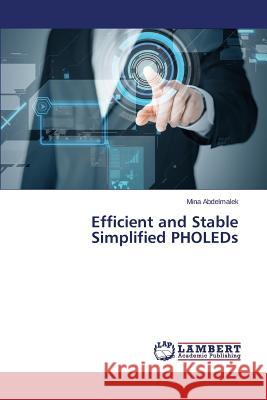Efficient and Stable Simplified PHOLEDs » książka
Efficient and Stable Simplified PHOLEDs
ISBN-13: 9783659675676 / Angielski / Miękka / 2015 / 100 str.
Organic Light Emitting Devices (OLEDs) have reached industrial maturity in display technology, since OLEDs provide salient advantages such as high brightness, fast response, wide viewing angle, mechanical flexibility, and low cost manufacturing. Due to the ability of electroluminescence (EL) from triplet excited states as well as singlet excited states, phosphorescent OLEDs (PHOLEDs) have a potential to achieve 100% internal quantum efficiency. Therefore, PHOLEDs can offer a competitive external quantum efficiency. However, the operational stability of PHOLEDs is relatively poor. Several mechanisms have been proposed to address the chemical and physical phenomena associated with intrinsic degradation of PHOLEDs, nevertheless, the reasons behind voltage rise and luminance loss accompanying PHOLEDs long term operation are not yet well understood. By studying the indium tin oxide (ITO)/organic interface in simplified PHOLEDs, it was found that this interface is critical to PHOLEDs performance. The study shows that, this interface is critical to the PHOLED overall stability and is considered as one of the limiting factors of the long term operational stability of simplified PHOLEDs.
Organic Light Emitting Devices (OLEDs) have reached industrial maturity in display technology, since OLEDs provide salient advantages such as high brightness, fast response, wide viewing angle, mechanical flexibility, and low cost manufacturing. Due to the ability of electroluminescence (EL) from triplet excited states as well as singlet excited states, phosphorescent OLEDs (PHOLEDs) have a potential to achieve 100% internal quantum efficiency. Therefore, PHOLEDs can offer a competitive external quantum efficiency. However, the operational stability of PHOLEDs is relatively poor. Several mechanisms have been proposed to address the chemical and physical phenomena associated with intrinsic degradation of PHOLEDs, nevertheless, the reasons behind voltage rise and luminance loss accompanying PHOLEDs long term operation are not yet well understood. By studying the indium tin oxide (ITO)/organic interface in simplified PHOLEDs, it was found that this interface is critical to PHOLEDs performance. The study shows that, this interface is critical to the PHOLED overall stability and is considered as one of the limiting factors of the long term operational stability of simplified PHOLEDs.











